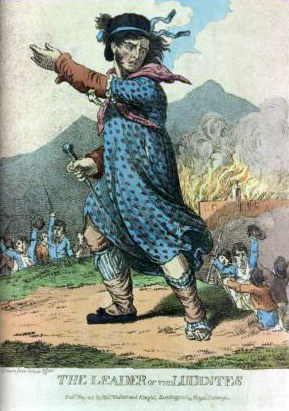JF Ptak Science Books Post 1991 ![]()
 If the young Ned Ludd had fallen asleep and somehow managed to stay in a reverential dreamland for the past 225 years or so, I wonder what he would think, awakening in 2013. Where would his ambitions lie, assuming that he awoke with the old fire still intact?
If the young Ned Ludd had fallen asleep and somehow managed to stay in a reverential dreamland for the past 225 years or so, I wonder what he would think, awakening in 2013. Where would his ambitions lie, assuming that he awoke with the old fire still intact?
Certainly the strength of his convictions would be displaced to some new area beyond smashing the machines that took away the jobs of workers and helped secure them as the lowest-end of a very new man-machine interaction that keep workers working hard for less money. Seeing that machines are everywhere, it would be a hard thing to reject, what most jobs in most areas depending upon a pile of machines that like the cosmological pile of turtles of James Jeans reaches all the way down and all the way up.
Ned Ludd may not have been real, but his name and at least imagined riotous activities against machines were real enough to give the Luddites their name. I think it is commonly believed today that a Luddite is simply anti-tech, but back at te turn of the 19th century and into its second decade, the Luddites were a definite force intent on destroying the very new machines that were taking away the jobs of skilled workers. In the 18-teens, it seems that most of the historical interest in this movement concentrates on their actions against machines in the textile industry: these were proto-"strikes", very physical labor protests against industry selecting machines over man. The threat grew so intense that following the threatening acts of the late 1780's attempting to protect industrial property from this sabotage, that in the war year of 1812 the Destruction of Stocking Frames, etc. Act 1812 (52 Geo 3 c. 16), also known as the Frame-Breaking Act was passed by an act of Parliament, which made it a capital offense to destroy mechanized looms. It was intended to break the back of the Luddite movement and preserve industry, and in the progress of the life of the limited act (it was designed to expire after two years), saw the execution of some 60-75 people for acts of violence against property. (The sentencing end of this act is a little difficult, as it seems that judges imposing sentences tended not to cite this act, though the result was the same.) The Frame Breaking Act was replaced by another less lethal act which sentenced lawbreakers to 10-20 years "exile" in Australia, but that too was short-lived and replaced by another flavor of the act that brought back the death penalty.
For whatever reasons, the Luddites seem to have been broken, or absorbed, or exhausted, by the end of the second decade of the 19th century. Mr. Ludd it seems never had a birth date and didn't seem to die, and may not have been an actual person. But as I said if he had slept for 225 years and entered consciousness again, today, it may well be the current evolution of human-machine interaction may be too advanced for him to address. Perhaps Ludd would be interested more in the coming future of human/machine development, when human bodies are disposable, and i hta tcase would fight for the right of humans to retain their humanity. But where would that fight start? Would he have rejected artificial hearts in the 1960's? Artifical hips? Would heart stents be a part of this encroaching history of the mechanization of humanity? And if that was so, would the innovations of Joseph Lister in sanitizing the operating theatre also be an unfavorable development? Would spectacles count? Haring aids? Canes" Wheelchairs? It does get very sticky, unless Mr. Ludd decided to draw the line in the sand at the future transmission of consciousness or whatever into a new non-carbon-based receptacle to cheat death.
Maybe Ludd would aim lower and higher at the same time, deciding that the computer and its veiny internet was the real culprit of contemporary human demise, seeing the world wide web as more a primitive attempt at a global consciousness that robs all of its users of their individual humanities. Of course he would have to become something on the lines of an alchemical adept in order to know how he and his confederates could hack and destroy the internet, causing what might be monumental collapse of the economic world as we know it, launching a new/old era of agrarianism.
Or maybe Ludd has something entirely different on his mind, like Captain Ahab not really thinking very much about The Whale at all, his mind elsewhere, concentrating just on the contract for hunting up a commission rather than an intellectual and hyper-spiritual trophy.
Philip K. Dick might have had a place for Ludd in one of his stories, which is about as much harm as he could do, unless resurrected by a super-evil-rich-nogoodnic with a mask and a cape intent on committing his Geniusopathia to Digiocide.



Comments